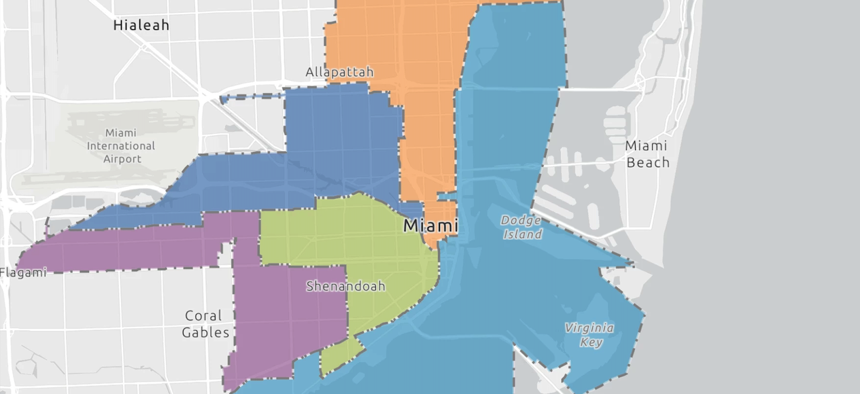Policy
Judge recommends City of Miami toss out its Commission district map
The reason: There is 'substantial evidence' of racial gerrymandering.

The current map of Miami's five commission districts, which a federal magistrate judge says should be changed. City of Miami
A U.S. magistrate judge has recommended that the City of Miami throw out its most recent district map and draft a new one before this November's elections, saying there is "substantial evidence" that the city is guilty of racial gerrymandering.
As reported last December, the ACLU of Florida and law firm Dechert LLP represented multiple Miami residents in suing the city over its most recently drawn commission district maps.
The city had redrawn its map early last year after the 2020 census showed outsized growth in District 2, which includes downtown, Brickell and much of the city's waterfront area.
In their complaint, the plaintiffs argued that the city used race and ethnicity as the primary rationale for drawing its districts, attempting to keep Districts 1, 3 and 4 predominantly Hispanic and District 5 predominantly Black, allegedly in violation of the Constitution.
In her decision, Judge Lauren Louis seemed to agree.
The "record before the Court contains substantial evidence that the Commission Districts are racial gerrymanders in violation of the Fourteenth Amendment," Judge Louis wrote in a recommendation filed in the Southern District of Florida late Wednesday night. "It is without meaningful dispute that race predominated the City’s drawing of District 5, ostensibly in effort to comply with the Voting Rights Act of 1965."
The plaintiffs had requested an speeded-up court order asking that a court bar the city from conducting any elections with the existing map, and require them to draw an entirely new one that is constitutionally compliant. Louis issued the recommendation that the plaintiff's request for an expedited injunction be granted.
The city argued that it would do greater harm to the residents if the map was thrown out, because there is not enough time to do so before the upcoming municipal elections this November. But Louis said there is enough time to issue a "remedial map" before the elections deadline.
"We are encouraged by the magistrate judge's thorough, well-reasoned report. We are hopeful the District Court will adopt these recommendations in full and block this racially gerrymandered map so that Miamians can vote under constitutional City Commission districts this November," said Nicholas Warren, staff attorney for the ACLU of Florida.
Because this was a magistrate judge's recommendation, both the plaintiffs and the city have a chance to object to it before May 13, and then respond to each other's objections by May 20, before the recommendation is kicked up to U.S. District Judge K. Michael Moore.
Miami City Attorney Victoria Méndez said that the city intends to object.
"The City disagrees with the report and recommendation of the magistrate and will file its objections and arguments to the federal judge who makes the final decision on the temporary injunction," Méndez wrote in an emailed statement.
It ultimately will be Moore's decision whether to grant the injunction and invalidate the city's current district map.
This story is published as part of a collaboration between City & State Florida and WLRN News. Joshua Ceballos is WLRN's Local Government Accountability Reporter and a member of the investigations team. Reach Ceballos at jceballos@wlrnnews.org.
NEXT STORY: In the dark: Feds will no longer confirm, deny existence of elections complaints
